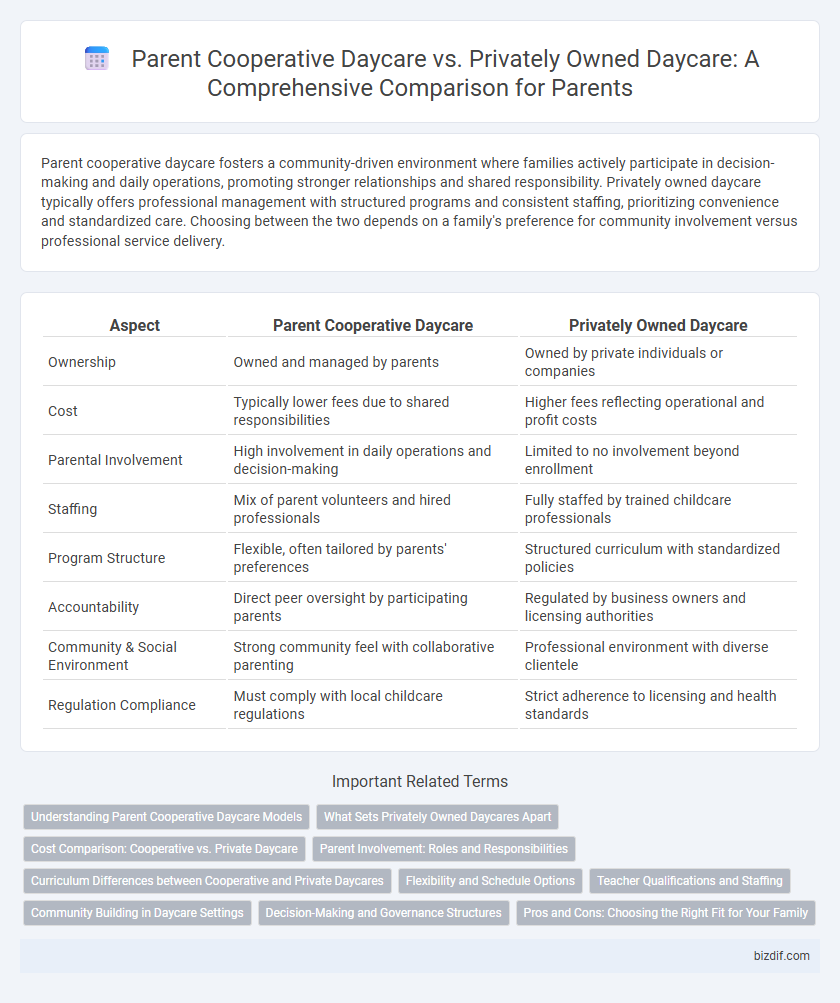Parent cooperative daycare fosters a community-driven environment where families actively participate in decision-making and daily operations, promoting stronger relationships and shared responsibility. Privately owned daycare typically offers professional management with structured programs and consistent staffing, prioritizing convenience and standardized care. Choosing between the two depends on a family's preference for community involvement versus professional service delivery.
Table of Comparison
| Aspect | Parent Cooperative Daycare | Privately Owned Daycare |
|---|---|---|
| Ownership | Owned and managed by parents | Owned by private individuals or companies |
| Cost | Typically lower fees due to shared responsibilities | Higher fees reflecting operational and profit costs |
| Parental Involvement | High involvement in daily operations and decision-making | Limited to no involvement beyond enrollment |
| Staffing | Mix of parent volunteers and hired professionals | Fully staffed by trained childcare professionals |
| Program Structure | Flexible, often tailored by parents' preferences | Structured curriculum with standardized policies |
| Accountability | Direct peer oversight by participating parents | Regulated by business owners and licensing authorities |
| Community & Social Environment | Strong community feel with collaborative parenting | Professional environment with diverse clientele |
| Regulation Compliance | Must comply with local childcare regulations | Strict adherence to licensing and health standards |
Understanding Parent Cooperative Daycare Models
Parent cooperative daycare models emphasize shared responsibility, where parents actively participate in daily operations, decision-making, and caregiving tasks. This collaborative structure fosters a strong community bond, reduces operational costs, and enhances transparency compared to privately owned daycare centers. Understanding these models highlights their benefits in promoting parental involvement and personalized care tailored to the children's needs.
What Sets Privately Owned Daycares Apart
Privately owned daycares distinguish themselves through flexible program offerings and extended hours tailored to meet diverse family schedules. These centers often invest in advanced learning materials and experienced staff, enhancing early childhood education quality. Their operational model allows for quicker adaptation to regulatory changes and market demands, setting them apart from parent cooperative daycares.
Cost Comparison: Cooperative vs. Private Daycare
Parent cooperative daycares typically reduce overall childcare costs by involving families in daily operations and decision-making, which lowers staffing expenses. Privately owned daycares often have higher fees due to professional staff salaries, facility maintenance, and profit margins. Families seeking budget-friendly options may find cooperative daycares more financially accessible, while private centers offer additional services and resources that justify their premium pricing.
Parent Involvement: Roles and Responsibilities
Parent cooperative daycares emphasize active parent involvement, where parents share responsibilities such as daily supervision, decision-making, and maintenance, fostering a community-driven environment. Privately owned daycares typically assign caregiving and administrative roles to professional staff, limiting parental participation to scheduled updates and occasional events. The cooperative model encourages deeper engagement, promoting personalized care and shared accountability, while private centers focus on professional expertise and standardized operations.
Curriculum Differences between Cooperative and Private Daycares
Parent cooperative daycares typically emphasize a curriculum driven by community values, parental involvement, and flexible learning approaches, incorporating play-based and social development activities tailored by active parent input. Privately owned daycares often follow standardized curricula designed by early childhood education professionals, focusing on structured developmental milestones, academic readiness, and regulatory compliance. The distinction lies in cooperative daycares' responsiveness to parental priorities versus private centers' consistency in applying established educational frameworks.
Flexibility and Schedule Options
Parent cooperative daycares often provide greater flexibility in scheduling due to direct parental involvement in operations, enabling adjustments tailored to family needs. Privately owned daycares typically offer fixed hours and structured programs, prioritizing consistency and professional staffing over adaptive schedules. Families seeking customizable care times may prefer parent cooperatives, while those valuing set routines might opt for privately owned facilities.
Teacher Qualifications and Staffing
Parent cooperative daycares typically rely on volunteer parents as assistant staff, which can lead to varying levels of teacher qualifications and less consistent staffing compared to privately owned daycares. Privately owned daycares often employ certified early childhood educators with formal training, ensuring professional standards and stable staffing ratios. This difference impacts the quality of care and education, making privately owned daycares more likely to maintain consistent teacher qualifications and experienced personnel.
Community Building in Daycare Settings
Parent cooperative daycares emphasize strong community building by involving families directly in daily operations and decision-making, fostering a collaborative environment that strengthens social bonds among parents and children. Privately owned daycares often focus on professional management and structured programs but may lack the same level of parental engagement and collective responsibility that enhances community connections. The cooperative model promotes shared values and active participation, creating a supportive network that benefits child development and family relationships in a more integrated way.
Decision-Making and Governance Structures
Parent cooperative daycares operate under a democratic governance model where parents actively participate in decision-making processes, enhancing community involvement and shared responsibility. Privately owned daycares maintain centralized decision-making authority, allowing for quicker implementation of policies but less parental input. Governance structures in parent cooperatives foster transparency and collective oversight, whereas privately owned centers rely on owner-directed management with defined operational protocols.
Pros and Cons: Choosing the Right Fit for Your Family
Parent cooperative daycares foster strong community involvement and lower costs by requiring parental participation but may demand significant time commitment and variable childcare quality. Privately owned daycares typically provide professional staff and consistent schedules with enhanced resources, yet they often come at higher fees with less parental control. Balancing cost, involvement level, and quality of care is essential in selecting the best daycare option for your family's needs.
Parent cooperative daycare vs Privately owned daycare Infographic

 bizdif.com
bizdif.com